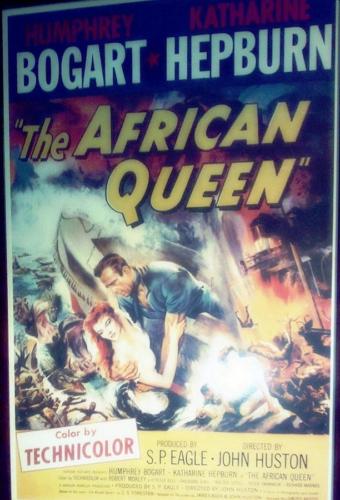Things are never so bad they can’t be made worse. – Humphrey Bogart

The movie poster, showing some of the troubles endured by the Captain and his passenger on his trip down the river.
What does that mean?
This quote is listed as being from the motion picture “The African Queen,” where he is the Captain of an ill-fated little steamer. Without going into the details, his ship gets banged up, shot up, sunk, suffers attacks by wild animals, and he almost gets himself hung. It just keeps getting worse. To some, that sounds like a bit depressing, but it is a simple fact. Things can always get worse.
The opposite is also true. Even when you think things can’t get any better, they can, and sometimes do. In reality, it’s just math (statistics, specifically). At any given point, things can get better or they can get worse. In the movie, the Captain just keeps rolling with the punches, taking what he can from each new situation. He’s not happy, but he keeps on going, as there aren’t any other options. This, I believe, is the heart of the quote, to not get too upset with what life sends your way.
Why is a realistic view important?
It is easy to become caught up in good times, as well as bad times. When things are going well, it’s often hard to imagine that your luck will change (unless you’re a pessimist). Similarly, if things are going poorly, it can often be easier to imagine things getting worse than to imagine things getting better.
The problem is the viewpoint the person has taken. This view will limit what you look for, and (by definition) what you can find. If you’re looking for ways things can get worse, will you spot the opportunity to make things better? Not as likely as if you are looking for things to get better, right?
Where can I apply this in my life?
My recommendation is to keep an eye out for how things could get better, as well as how they could get worse. Have an idea or two for how you might deal with each situation. Be prepared for a chance to head off something going bad, and prepared to take advantage of an opportunity to make things better.
To some, the difficulty to this method is detaching oneself from the situation. Even after years of practice, I still have trouble at times. To have a realistic view, one must be able to calmly and logically assess a situation. That means setting aside emotions and attachments for a moment while looking at where you stand.
For me, as an engineer, it’s what I’m trained to do. Even then, it can be hard to be objective when reviewing your own work. That’s why we have other people do it for us (called ‘Peer Reviews’). It’s easier for others to spot the deficiencies or other problems in your work, as they aren’t vested in it. We also look for ways to make things better, or note (and remember) exceptionally good solutions.
Take a moment and consider what are you doing that others think is going badly, but you disagree. Are you being realistic, or are your emotions influencing your judgement? I know it has happened to me more than a few times, at work, at home, in relationships, and in nearly every other aspect of my life.
Have you come up with something, either in the present or in the past, which fits the description? Think about how well each worked out. How often were you right? I hope your batting average was much better than mine. Almost every single one went against me, and the few where I succeeded, each underwent a significant change when I realized how messed up things were.
What about the other way around? Can you think of times when you wanted to give up, and others were telling you to keep at it, to hang on just a little longer, or give it one more try? Yeah, it’s happened to me, more times than I would like to remember. It still happens on occasion.
Unfortunately for me, in nearly every instance, I convinced myself that my logic was correct and the others were wrong, and I quit. Fortunately, I was able to pick a few of these projects up again and complete them, once I got over myself and was able to get a more realistic view of the situation.
Think about what had to happen before you could get a solid grip on the situation. What helped you get a realistic view of the situation? What can you do to make it easier to get to the point where you can better assess your situation? The point of the exercise is to make better decisions, more realistic decisions, neither governed by emotions nor by moods, but by facts.
No one has a crystal ball. We don’t know when things will get better or worse. But we can prepare for each, if we can get an accurate view of where we stand and what the present situation actually is. The more you know, and the more accurate the information, the better you can anticipate possible changes. While it can always get worse, it can also get better.
From: Twitter, @MyPE
confirmed at : http://www.brainyquote.com/quotes/quotes/h/humphreybo108860.html
Photo by muammerokumus







Still a really good exposition you wrote for a hell of a good quote. Thanks!
Glad you liked it!
I am saddened to say that I may have been taken in by the quote databases on the internet. I recently watched the restored version of The African Queen on Netflix, and the quote was not uttered. Not even once, not even by someone else. It fits the theme of the movie, but at least in the version I saw, it wasn’t there. Sorry about that. I shall endeavor to be more diligent in the future.